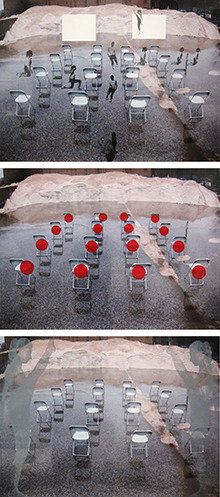Emily Roysdon
dal 11/12/2010 al 5/3/2011
Segnalato da
11/12/2010
Emily Roysdon
Berkeley Art Museum and Pacific Film Archive BAM/PFA, Berkeley
If I Don't Move Can You Hear Me? / Matrix 235. The artist and writer produces projects at the intersection of social, political, and aesthetic space, evincing an interest in the invisible histories of public sites, the potencies of both language and movement, and the possibilities of abstraction as a formal and mental construct. For this exhibition, Roysdon has paired videos that she recently produced in Stockholm with photographic pieces made in Berkeley.

curated by Phyllis Wattis, Matrix Curator Elizabeth Thomas
The University of California, Berkeley Art Museum and Pacific Film Archive (BAM/PFA) proudly presents Emily Roysdon: If I Don’t Move Can You Hear Me? / Matrix 235, the artist and writer’s first solo museum show in the United States. Emily Roysdon produces projects at the intersection of social, political, and aesthetic space, evincing an interest in the invisible histories of public sites, the potencies of both language and movement, and the possibilities of abstraction as a formal and mental construct. Her practice is shaped by collaboration, and its implication of negotiation, improvisation, and dialogical thinking. This is embodied in her activities as the editor and cofounder of the influential queer feminist journal and artist collective LTTR; as a member of the band MEN; and as a curator, most recently of Ecstatic Resistance.
For this exhibition, Roysdon has paired videos that she recently produced in Stockholm with photographic pieces made in Berkeley; these works are part of Roysdon’s evolving vocabulary around movement, choreography, collectivity, and abstraction. For videos produced in Stockholm, Roysdon used Sergels Torg, a public square planned as the location for all political speech in the city, as a site to think through the complexities of public space, vernacular movement, and regulation. This joins a new photographic work produced improvisationally on-site in Berkeley, that engages with the limits, framing, and representation of movement. Still images are silkscreened with a vocabulary of bodily gestures, creating experimental scores for performance that layer time and implied action in physical space. Together the works set forth an exploration of these interrelated themes—movement, struggle, improvisation, impossibility—across conceptual, material, and real gestures.
As part of the exhibition Roysdon has invited pairs of other writers and thinkers to consider the project’s growing vocabulary of use, regulation, structure, and frame in a new publication that will be distributed in the gallery. Contributors include Michelle Dizon and Camilo Ontiveros, Craig Willse and Silvana DePaula, Eileen Myles and Leopoldine Core, Melissa Anderson and Nathan Lee, Andrea Geyer and Jane Anderson, Matt Wolf and Chris Moukarbel, Ridykeulous, Francesco Gagliardi and Isla Leaver-Yap, Tirza True Latimer and Adrienne Skye Roberts, and Celeste Dupuy-Spencer and Jeanine Oleson. The publication is designed by Studio SM, Stockholm.
Emily Roysdon’s recent and upcoming projects include West Street, an artist’s book combining her work with photographs from the estate of Alvin Baltrop, commissioned by Printed Matter’s New York Art Book Fair; 2010 Whitney Biennial at the Whitney Museum of American Art, New York; Mixed Use: Manhattan at the Reina Sofia, Madrid; Manifesta 8 in Murcia, Spain; Bucharest Biennial; Greater New York at MOMA PS1, New York; and a solo project at Konsthall C, Stockholm.
Performance and Screening
Sunday, December 12, 3 p.m.
Galleries 1 and B
Emily Roysdon’s frequent collaborators, Craig Willse and Chris Vargas, will present a performative reading of A Queer Relational Associative Project Dictionary, a zine that Roysdon created for her MATRIX exhibition. In addition, Roysdon will screen Social Movement and Story of History, two films in the series that now includes If I Don’t Move Can You Hear Me?
Admission is free.
For more information about the exhibition and special programs visit: http://bampfa.berkeley.edu/exhibition/235
Image:
Impossible Always Arrives (I'm Sorry 1), 2010
Impossible Always Arrives (I’m Sorry 2), 2010
Impossible Always Arrives (bas relief), 2010
All: Collage of digital chromogenic, paper lithograph, and wood block prints; 35 × 48 in.; printed with Marina Ancona at 10 Grand Press, Brooklyn, NY, courtesy of the artist.
Media Relations Manager:
Peter Cavagnaro (510) 642-0365 pcavagnaro@berkeley.edu
University of California, Berkeley Art Museum and Pacific Film Archive (BAM/PFA)
2626 Bancroft Way Berkeley, CA 94720
The Berkeley Art Museum and Pacific Film Archive (BAM/PFA) is the visual arts center of the University of California
2626 Bancroft Way, just below College Avenue near the UC Berkeley campus.
Gallery and Museum Store Hours: Wednesday through Sunday, 11–5. Open L@TE Fridays until 9 p.m. Closed Monday and Tuesday.
Admission: General admission is $10; admission for seniors, disabled persons, non–UC Berkeley students, and young adults (13–17) is $7; admission for BAM/PFA members, UC Berkeley students, staff, and faculty, and children under 12 is free. Admission is free on the first Thursday of each month.



